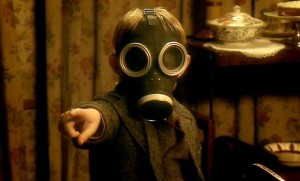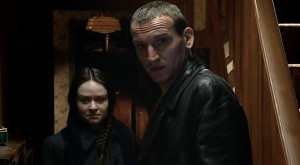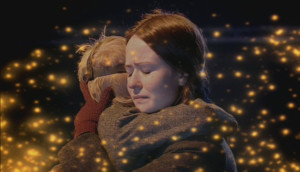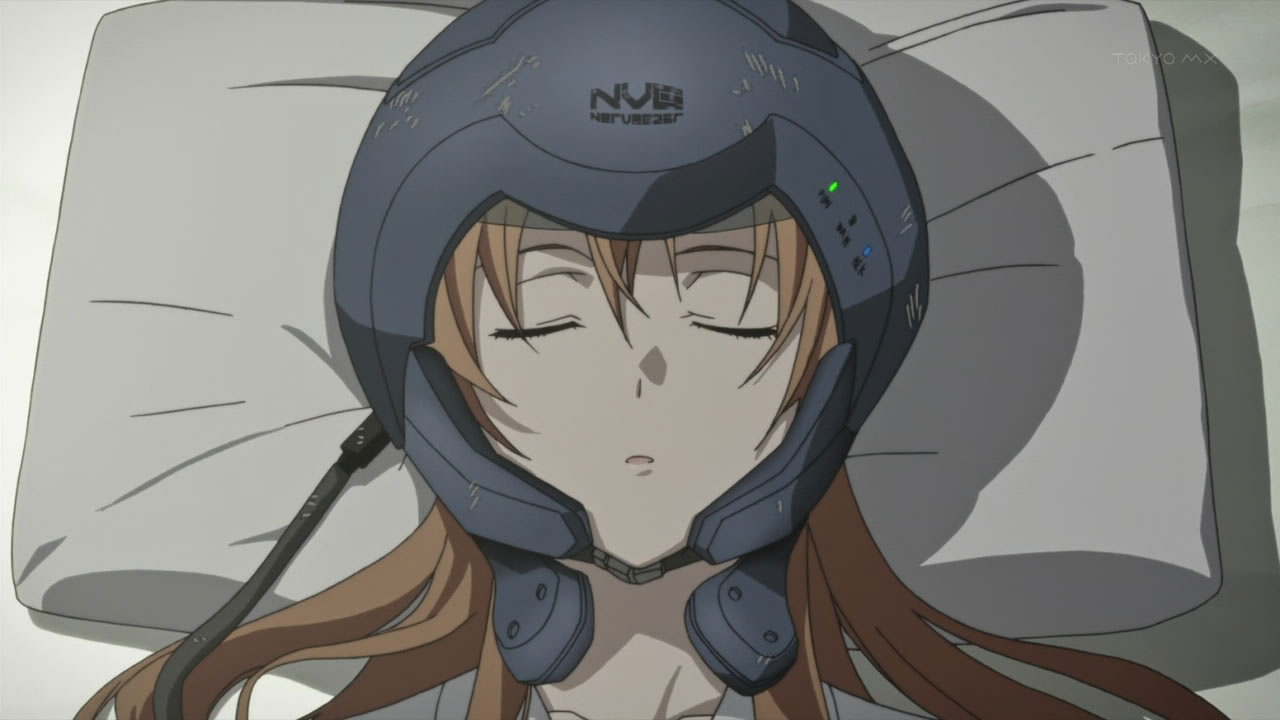 This two-episode adventure is Moffat’s first real foray into writing for Doctor Who, after his highly respected WHO-parody called “The Curse of Fatal Death” which aired in 1999. These episodes, like much of Moffat’s writing, are full of delicious lines, and Eccleston nails them all! Moffat is very talented, and his episodes are some of my all-time favorites. He often strikes a perfect balance between comedy and tragedy, and is at his best when the situation couldn’t be more bleak, and yet the viewer is buoyed by a hopeful sense of humor.
This two-episode adventure is Moffat’s first real foray into writing for Doctor Who, after his highly respected WHO-parody called “The Curse of Fatal Death” which aired in 1999. These episodes, like much of Moffat’s writing, are full of delicious lines, and Eccleston nails them all! Moffat is very talented, and his episodes are some of my all-time favorites. He often strikes a perfect balance between comedy and tragedy, and is at his best when the situation couldn’t be more bleak, and yet the viewer is buoyed by a hopeful sense of humor.
(When I’m writing Who-ology posts around-abouts season 6, I am going to link this article to prove that I praised Moffat’s writing. Lavishly. It will be like time-travel!)
I had very limited Doctor Who context my first time through the 2005 reboot, so episodes 9 and 10 were my introduction to Doctor Who’s fairly strong reputation for being utterly terrifying. These episodes are indeed terrifying, but in my favorite kind of way: when simple, every day things are shifted just enough to turn them horribly, horribly wrong. (Moffat is a master of this; see also: “Silence in the Library” or “Blink”). Coincidentally, “The Empty Child,” combined with its conclusion “The Doctor Dances,” presents one of the most hopeful Doctor Who adventures to date. It is in many ways a classic zombie tale, and as such stories tend, offers a lot of thematic brain-food (ha ha ha) about humanity and its brokenness.
 The Doctor and Rose follow a mysterious object through space and time into 1941-London. They lose track of it, and in the process of trying to figure out where it landed, the Doctor encounters Nancy–a young girl who cares for a host of street kids by any means necessary (ie: stealing), and is haunted by a four-year-old in a gas mask who constantly asks “are you my mummy?” Any time this enigmatic, faceless child shows up, Nancy and the others run from it in terror: a fact that befuddles the Doctor.
The Doctor and Rose follow a mysterious object through space and time into 1941-London. They lose track of it, and in the process of trying to figure out where it landed, the Doctor encounters Nancy–a young girl who cares for a host of street kids by any means necessary (ie: stealing), and is haunted by a four-year-old in a gas mask who constantly asks “are you my mummy?” Any time this enigmatic, faceless child shows up, Nancy and the others run from it in terror: a fact that befuddles the Doctor.
Child: Mummy? Mummy? Please let me in, mummy. Please let me in, mummy.
(A little hand comes through the letter box)
Doctor: Are you all right?
Child: Please let me in.
(Nancy throws something that breaks, and the hand withdraws)
Nancy: You mustn’t let him touch you!
Doctor: What happens if he touches me?
Nancy: He’ll make you like him.
Doctor: And what’s he like?
Nancy: I’ve got to go.
Doctor: Nancy, what’s he like?
Nancy: He’s empty.
This is the fulcrum of the story. Our “big bad” here (Whedon reference: check) is this child, once a little boy named Jamie. Nancy warns the Doctor that though the boy looks alive, he is actually a hollow, dangerous thing that can pass his condition to others by touch. Throughout the episode, we watch as this “empty child” searches for his origin (“are you my mummy?”). Each time he instinctively reaches out to connect, he only manages to spread his emptiness. The Doctor discovers a whole hospital full of people to whom this has happened. They all bear the same head-trauma, scar on their hand, and gas mask that is not covering their face as much as it has become their face. They are an extension of “Jamie,” who unwittingly controls them all.
What better setting to explore real-world brokenness than WWII-era London, at the height of the London Blitz? The city is dark and dust-covered. Sirens are wailing, warning people to get to bomb shelters. The troubled Nancy is surrounded by starving kids. The four-year-old Jamie, now our “empty child,” was killed. Even as Moffat takes us into a fictional story about aliens and time travel, the historical setting presents the undeniable reality that mankind’s brokenness has catastrophic consequences.
Ultimately, the origin of this terrifying danger is alien technology (nanobots) from the aforementioned “mysterious object.” The nanobots are only acting according to their program: to repair things. Crashing into 1941-London, they encounter a dead child, and believing this damaged human to be the species’ natural form, they go about rebuilding humanity in this broken image.
We are constantly face to face with the sin and tragedy that are the consequence of our “broken image.” But we were not always like this. We have an origin that is whole and perfect and beautiful. The closest we can get to glimpsing that original design is in the character of Jesus, but we also see signs of it in nature, art, relationships–we get little flashes of the something bigger that exists beyond our current situation: a victory is coming, an unbelievable restoration.
 In the case of this Doctor Who story, the “whole image” is represented by truth, connection, self-sacrifice, and forgiveness in the character Nancy. Fear and distrust keep it hidden for a while, but when courage and trust finally bring it out in the open, it is the agent of healing. It brings the nanobots face to face with the true form of humanity, and they are able to correct what they have done in Jamie and in those he “infected,” restoring everyone not to their original state, but to their best possible health.
In the case of this Doctor Who story, the “whole image” is represented by truth, connection, self-sacrifice, and forgiveness in the character Nancy. Fear and distrust keep it hidden for a while, but when courage and trust finally bring it out in the open, it is the agent of healing. It brings the nanobots face to face with the true form of humanity, and they are able to correct what they have done in Jamie and in those he “infected,” restoring everyone not to their original state, but to their best possible health.
One of the most moving scenes from this story is when Nancy laments to Rose that there is no hope or future left to them, and gets an unexpected response.
Rose: Nancy, this isn’t the end. I know how it looks, but it’s not the end of the world or anything.
Nancy: How can you say that?? Look at it.
Rose: Listen to me. I was born in this city. I’m from here, in like, fifty years time.
Nancy: From here?
Rose: I’m a Londoner. From your future.
Nancy: But, but you’re not–
Rose: What?
Nancy: German.
Rose: Nancy, the Germans don’t come here. They don’t win. Don’t tell anyone I told you so, but you know what? You win.
By Nancy’s estimation, based on the compelling evidence about her, all is lost; there is no force that will hold back the darkness of the world. But despite how things seem, it is nevertheless true that there is victory coming. For London, for her, or for us.
The episode ends with celebration–dancing, in fact! I find this episode truly hopeful, because I believe that although healing may feel sparse here, we have a grand promise of ultimate victory, when we will be made completely whole again and brokenness will be no more.


